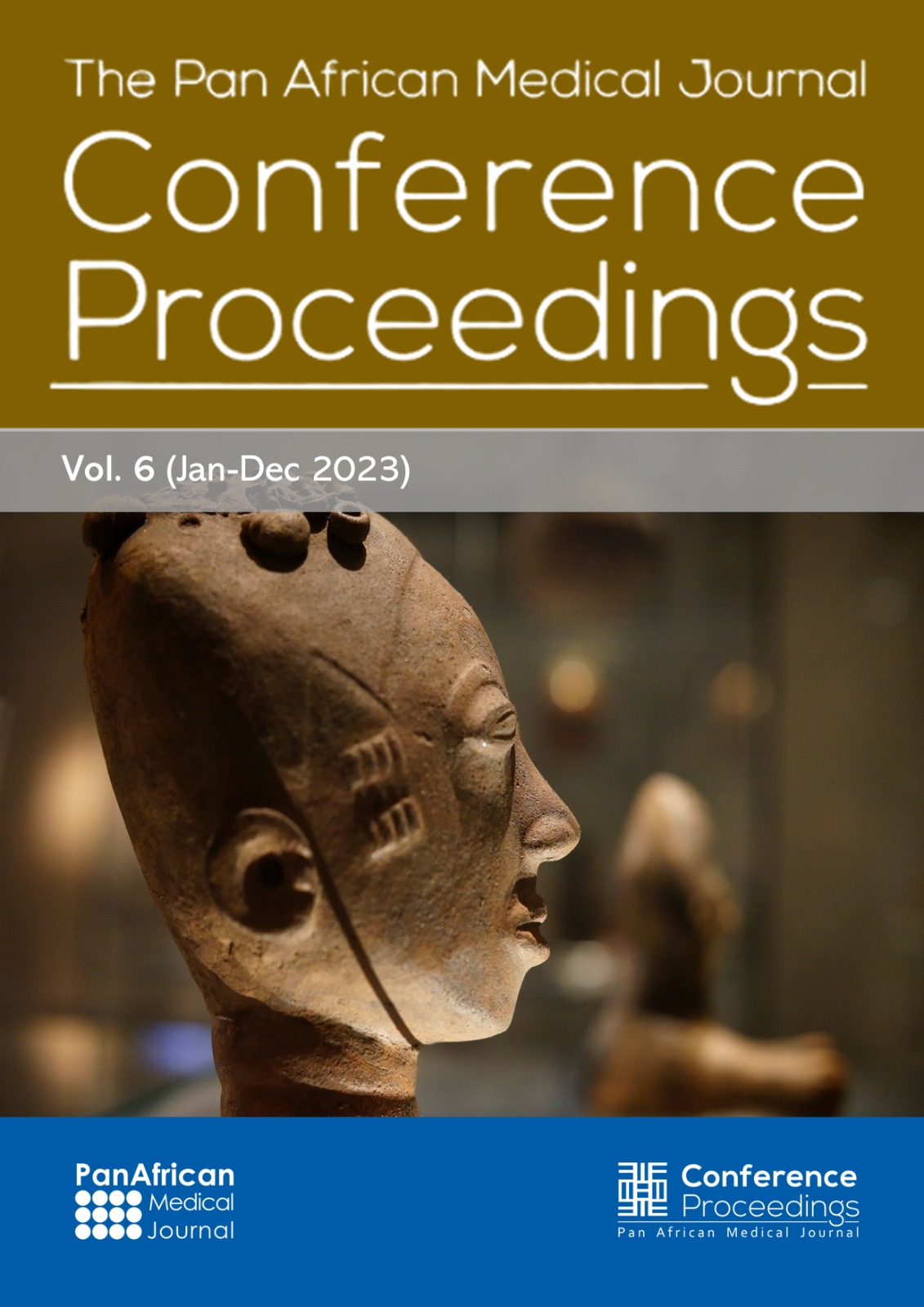Conference abstract
Improving access to PMTCT through the involvement of traditional birth attendants in program activities in the Far North Region of Cameroon: a retrospective cohort study
Pan African Medical Journal - Conference Proceedings. 2023:18(159).03
Oct 2023.
doi: 10.11604/pamj-cp.2023.18.159.2276
Archived on: 03 Oct 2023
Contact the corresponding author
Keywords: Pregnancy, delivery, healthcare
Oral presentation
Improving access to PMTCT through the involvement of traditional birth attendants in program activities in the Far North Region of Cameroon: a retrospective cohort study
Jerome Ateudjieu1,2,3,&, Paul Ngu Nembo3, Ketina Hirma Tchio-Nighie1,2, Collins Buh Nkum2, Charles Kouanfack1, Anne-Cecile Bisseck3
1Department of Public Health, Faculty of Medicine and Pharmaceutical Sciences, University of Dschang, Dschang, Cameroon, 2Department of Health Research, M.A. SANTE (Meilleur Accès aux Soins de Santé), Yaoundé, Cameroon, 3Division of Health Operations Research, Ministry of Public Health, Yaoundé, Cameroon
&Corresponding author
Introduction: maternal and child mortality is higher in the Cameroon part of the Lake Chad basin compared to the rest of the country because of limited access to recommended care during pregnancy and delivery. The majority of deliveries in these settings are assisted by traditional birth attendants (TBA). The present study aimed to assess if training and involving TBA in community-based PMTCT interventions can contribute to improving targeted population access to these interventions.
Methods: this was a retrospective cohort study that assessed among mothers of children aged 0-24 months the effect of training and involving TBA in PMTCT activities. The exposed mother-child couples were those inhabiting communities where TBA was trained and involved during the 24 previous months in PMTCT activities (exposed communities) while the non-exposed groups were those living in communities with no study intervention. Data were collected in households selected by stratified cluster random sampling from children’s mothers or guardians using a face-to-face administered questionnaire (undocumented) and from antenatal booklets (documented) used in health facilities to record antenatal care.
Results: a total of 581 mother-children couples were included, 293 (50.4%) in the exposed group and 288 (49.6%) in the control group. Exposed mother-child couples had significantly higher reported and documented access to mother antenatal HIV testing compared to the couples living in non-exposed communities with adjusted relative risk (ARR) of 1.6 (1.2-2.0) and 3.5 (2.4-5.1) respectively. The mean number of antenatal consultations was not significantly higher in the exposed group [Regression coefficient (R)=0.18 (-0.18-0.55), p-value (p)=0.327)] whereas the mean number of HIV tests received by the mothers in the exposed communities during the antenatal life of children was significantly higher [R=1.12 (0.93-1.32), p=0.00)].
Conclusion: the training and involvement of TBA in delivering PMTCT interventions at a community level can improve population access to these interventions. The consistency of these findings should be tested in other communities in need and with other healthcare interventions.
Improving access to PMTCT through the involvement of traditional birth attendants in program activities in the Far North Region of Cameroon: a retrospective cohort study
Jerome Ateudjieu1,2,3,&, Paul Ngu Nembo3, Ketina Hirma Tchio-Nighie1,2, Collins Buh Nkum2, Charles Kouanfack1, Anne-Cecile Bisseck3
1Department of Public Health, Faculty of Medicine and Pharmaceutical Sciences, University of Dschang, Dschang, Cameroon, 2Department of Health Research, M.A. SANTE (Meilleur Accès aux Soins de Santé), Yaoundé, Cameroon, 3Division of Health Operations Research, Ministry of Public Health, Yaoundé, Cameroon
&Corresponding author
Introduction: maternal and child mortality is higher in the Cameroon part of the Lake Chad basin compared to the rest of the country because of limited access to recommended care during pregnancy and delivery. The majority of deliveries in these settings are assisted by traditional birth attendants (TBA). The present study aimed to assess if training and involving TBA in community-based PMTCT interventions can contribute to improving targeted population access to these interventions.
Methods: this was a retrospective cohort study that assessed among mothers of children aged 0-24 months the effect of training and involving TBA in PMTCT activities. The exposed mother-child couples were those inhabiting communities where TBA was trained and involved during the 24 previous months in PMTCT activities (exposed communities) while the non-exposed groups were those living in communities with no study intervention. Data were collected in households selected by stratified cluster random sampling from children’s mothers or guardians using a face-to-face administered questionnaire (undocumented) and from antenatal booklets (documented) used in health facilities to record antenatal care.
Results: a total of 581 mother-children couples were included, 293 (50.4%) in the exposed group and 288 (49.6%) in the control group. Exposed mother-child couples had significantly higher reported and documented access to mother antenatal HIV testing compared to the couples living in non-exposed communities with adjusted relative risk (ARR) of 1.6 (1.2-2.0) and 3.5 (2.4-5.1) respectively. The mean number of antenatal consultations was not significantly higher in the exposed group [Regression coefficient (R)=0.18 (-0.18-0.55), p-value (p)=0.327)] whereas the mean number of HIV tests received by the mothers in the exposed communities during the antenatal life of children was significantly higher [R=1.12 (0.93-1.32), p=0.00)].
Conclusion: the training and involvement of TBA in delivering PMTCT interventions at a community level can improve population access to these interventions. The consistency of these findings should be tested in other communities in need and with other healthcare interventions.








